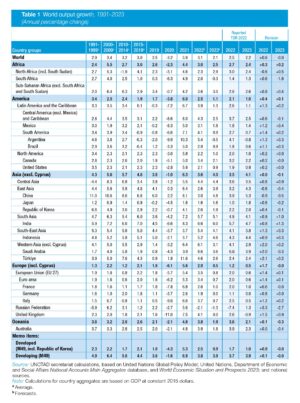The United Nations Trade and Development Conference (UNCTAD) in its latest Trade and Development Report Update released on April 12 warns that developing countries are facing years of difficulty as the global economy slows down amid heightened financial turbulence.
Annual growth across large parts of the global economy will fall below the performance registered before the pandemic and well below the decade of strong growth before the global financial crisis.
The UN trade body estimates that interest rates hikes will cost developing countries more than $800 billion in foregone income over the coming years. UNCTAD expects global growth in 2023 to drop to 2.1%, compared to the 2.2% projected in September 2022, assuming the financial fallout from higher interest rates is contained to the bank runs and bailouts of the first quarter.

Many developing countries face a deepening development crisis as soaring debt levels and higher servicing costs squeeze productive investment in both the public and private sectors. A shortfall of international liquidity has already turned unforeseen shocks into a vicious financial cycle in some countries.
UNCTAD finds that 81 developing countries (excluding China) lost $241 billion in international reserves in 2022, an average decline of 7%, with over 20 countries experiencing a drop of over 10% and in many cases exhausting their recent addition of Special Drawing Rights (SDRs). Meanwhile, borrowing costs, measured through sovereign bond yields, increased from 5.3% to 8.5% for 68 emerging markets. Overall, external creditors’ pressure on developing countries to reduce fiscal deficits is expected to increase.
UNCTAD highlights that debt distress will result in a development crisis and wider inequalities, with 39 countries paying more to their external public creditors than what they received in new loans, causing an adverse impact on public investments and social protection.
Over the last decade, debt servicing costs have consistently increased relative to public expenditure on essential services. The number of countries spending more on external public debt service than healthcare increased from 34 to 62 during this period.
UNCTAD says that even if financial conditions stabilize, the slowdown in economic growth in many developing countries combined with the end of the cheap money era points to future rounds of debt distress.

























